Portland has layers of culture. The biggest sub-culture is food carts. Food carts are booming in downtown Portland and are spreading to other neighborhoods across the river. Entrepreneurs are joining many others on the opportunity to build their own business and contribute to this phenomenon. Portland consumers are flocking to food carts for breakfast, lunch, and dinner. Why are food carts more popular in Portland now than it has ever been?

HISTORY
History of Food Carts or How the Recession Created a Fad
Food carts in Portland started as early as the 1910s when Joseph Gatto started selling with his horse pulled cart. In the 1930s Gatto’s cart business became a warehouse business that is still running today. Fast forward to 2000, food carts were seen in the downtown area and in empty lots. Portland was home to about 175 food carts in 2001 and numbers started growing in various neighborhoods like Sellwood and Cully.
The recession of 2007 did not stop food carts; it brought chefs, foodies, and entrepreneurs to the streets of Portland to start their own food carts. The recession created an explosion for this food culture because it allowed people to be adventurous without spending too much. By 2010, there was a 40% increase in 2 years with food carts spreading from downtown to NE Portland.
Between 2012 and 2014, new designations were implemented for food cart locations to increase the number of food carts in the county. By 2014 there were over 600 food carts with several of them turning into established restaurants because of their insane popularity.
Food carts have become a place for foodies because they have adapted to the wants and needs of their consumers from the start of the 21st-century.

Sources:
https://www.portlandoregon.gov/bps/article/303162
https://www.portlandoregon.gov/bps/article/200738
GOVERNMENT & SUPPORT
If you are an entrepreneur looking to start up a business or if you’re a foodie looking for a quick, tasty bite to eat, then Portland’s food cart scene is the place for you. Portland offers food cart vendors with cheap fees to enter the food cart business and provides them with support organizations to connect with consumers.

Government Policies:
Part of the reason for the success of food carts in Portland is due to the fact that licenses and fees to start a food truck are affordable and easy. In the city of Portland, the most expensive license fee for a food cart is $465 a year, while the average restaurant is nearly double that (MultnomahCounty). Portland welcomes food carts and has made it fairly simple for the carts to become established. Before any sales take place, all food carts must get licensed and pass a health inspection. This applies to all portable vehicles where food is being handled or sold to consumers (MultnomahCounty). Once these requirements are passed, then an entrepreneur is able to be open for business.
Support Organizations:
The city enjoys the food as well as the economic and cultural benefits that come with having food carts. According to foodcartsportland.com, the website works closely with food cart vendors to provide consumers with catering for events, conventions, or lunch parties. On their website, they promote over 500 vendor locations so that foodies can see the many different food carts in the area.
Portland Eat Mobile Festival showcases the people and food that makes Portland’s food scene so unique. At this festival, food cart vendors sell and exhibit their food, while competing for the Carty Award. All tickets sold for the event include samples from the 30+ trucks (wweek.com).
The point of recognizing Portland’s food truck community is because it has become a mecca for great food. These food cart vendors have started a cultural following and it is a place where entrepreneurs can start an affordable business. These food cart vendors have started a community of their own and they offer consumers quick, authentic, and affordable cuisine.
Source:
https://multco.us/services/food-carts-mobile-food-units
http://www.foodcartsportland.com
http://www.wweek.com/portland/flex-230-eat-mobile.html
CULTURE
Food carts have been gaining fast attention from Portland locals, creating a culture within the small community of the even smaller kitchens, cranking out big smells on each city block. The ‘Keep Portland Weird’ slogan holds true in every aspect of the city—food carts are no exception. Approximately 600 food carts sprawl Portland, often side by side with other carts (creating pods), from east to west and north to south. (Travel Portland) The quirks of the food carts are what has caused it to turn into a life of its own. Each cook is allowed, and at times more often encouraged, to create dishes that break the mold of restaurant dining. The food carts originality often stems from the cooks leaving the rest-
 raints of a restaurant kitchen. Each vendor has the time to perfect his or her menu down to the last ingredient. Since Portland is in close proximity to natural beauty, it makes it possible to buy hyper-local offerings. The farm to fork dining is what has skyrocketed food cart success. Portland locals want organic, fresh, and in season. It’s the variety that makes Portland food carts different from anywhere else. Anyone can find a dish that meets his or her dietary needs or wants—vegetarian, vegan, dairy and gluten free, etc… All about innovation, the food carts have a mutual understanding that it is not cool to duplicate a dish another
raints of a restaurant kitchen. Each vendor has the time to perfect his or her menu down to the last ingredient. Since Portland is in close proximity to natural beauty, it makes it possible to buy hyper-local offerings. The farm to fork dining is what has skyrocketed food cart success. Portland locals want organic, fresh, and in season. It’s the variety that makes Portland food carts different from anywhere else. Anyone can find a dish that meets his or her dietary needs or wants—vegetarian, vegan, dairy and gluten free, etc… All about innovation, the food carts have a mutual understanding that it is not cool to duplicate a dish another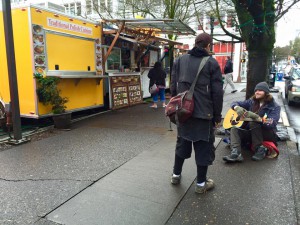 cart is already making—this sparks creative competition among the pods. Customers then have the advantage of everyone’s ‘oddities’ coming together to create a unique population among food carts, raising the bar higher with each new recipe.
cart is already making—this sparks creative competition among the pods. Customers then have the advantage of everyone’s ‘oddities’ coming together to create a unique population among food carts, raising the bar higher with each new recipe.
Food brings people together, and a study commissioned by the city’s bureau of planning found that, “food carts have a positive impact of street vitality and neighborhood life and advance public value, including community connectedness and distinctiveness, equity and access, and sustainability” (Bower, 2012). Portland’s blossoming food cart haven attracts people of every age. Portland has a friendly culture of it’s own, so as teenagers flock to the 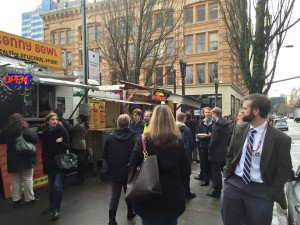 sidewalks—because the food is affordable and delicious—they eat alongside business professionals, who are within walking distance from the pods and during their lunch break are able to grab a quick bite before heading back to the office. Food carts then turn into a late night frenzy when party-goers are stumbling out of clubs and into lines to chow down on cheesy fries.
sidewalks—because the food is affordable and delicious—they eat alongside business professionals, who are within walking distance from the pods and during their lunch break are able to grab a quick bite before heading back to the office. Food carts then turn into a late night frenzy when party-goers are stumbling out of clubs and into lines to chow down on cheesy fries.
“Food Carts – Travel Portland.” Travel Portland. Web. 30 Jan. 2015. <http://www.travelportland.com/collection/food-carts/>.
Bowen, Dana. Saveur. N.p., 5 Aug. 2012. Web. 31 Feb. 2015. <http://www.saveur.com/article/Travels/Portland-Food-Trucks>
BRANDS
PBJs Grilled to Perfection
People living in the city are all about convenience. They want something cheap, fast but of good quality. That is exactly what the Portland food carts are serving up. Because the food carts are, for the most part, stationary, the people of Portland have no need to constantly track and chase down their favorite food. The food carts offer sustainability, affordability, entrepreneurship, originality, and artistry—all things the city of Portland is founded on.
Every foo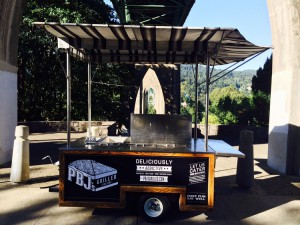 d cart in Portland shares a love and passion for making food and making people happy. Each individual food cart is a brand in and of itself. Every cart has its own name, identity, strategy and audience. But in order to be successful, you need to be memorable; and the PBJ’s Grilled cart is doing just that.
d cart in Portland shares a love and passion for making food and making people happy. Each individual food cart is a brand in and of itself. Every cart has its own name, identity, strategy and audience. But in order to be successful, you need to be memorable; and the PBJ’s Grilled cart is doing just that.
The PBJ’s Grilled cart is serving up your favorite childhood brown bag lunch with a twist. Offering over ten different versions of sweet and savory peanut butter and jelly sandwiches, the PBJ’s grilled cart is doing something no other cart in Portland is doing. They pride themselves in serving good quality food by using fresh ingredients like locally made bread and house made jam. A local favorite is the “Hot Hood” grilled sandwich, which is described as a combination of peanut butter, roasted jalapenos, bacon and cherry jam. They are also offering personal modifications for sandwiches if desired, such as vegan and gluten free, two variations popular amongst Portland culture.
This cart is also using a strategy commonly used by vendors all throughout Portland—the strategy of teamwork. PBJ’s Grilled has teamed up with brands such as Soul Hot Sauce, Brew Dr. Kombucha and Fall Hornin beer to promote one another on the streets as well as social media. We see collaboration between carts, products and other restaurants quite often in the city of Portland. This allows the brands to reach out to different audiences and expand their market; it’s a win-win for both sides. The PBJ’s Grilled cart has also teamed up with other carts to give each other shout outs on social media, such as Twitter, in hopes of gaining followers and internet popularity.
PBJ’s Grilled is also marketing themselves on Instagram, Facebook and YouTube, a smart move for a business as tiny as them. The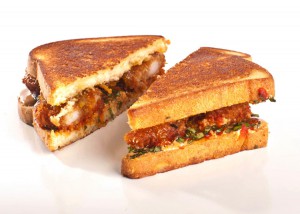 cart has recently undergone a switch in ownership and has been revamped for the new year. Through this revamp, PBJ’s Grilled has used social media to stay in contact with their customers and maintain a strong relationship with them, even though they weren’t physically in action. Without using social media, the truck could have easily fallen off the radar and could have possibly had to work to rebuild a follower base.
cart has recently undergone a switch in ownership and has been revamped for the new year. Through this revamp, PBJ’s Grilled has used social media to stay in contact with their customers and maintain a strong relationship with them, even though they weren’t physically in action. Without using social media, the truck could have easily fallen off the radar and could have possibly had to work to rebuild a follower base.
Source:
http://www.pbjsgrilled.com
ADVANTAGES
Food carts have become a part of the life and blood of Portland’s food culture. Food carts are great for offering different and affordable options for those looking for a quick meal. Yet their significance in Portland goes beyond their unique tastes; together the food carts have created a “can-do” atmosphere amongst the small business community. When the recession hit in 2009, food carts were able to re-invent neighborhoods and revive the city. Which helped attract other spenders, retail outlets, restaurants and cafes (About). Food carts give restaurant entrepreneurs a chance at their dream when they might not have the capital or credit to open their own full-fledged restaurants. While restaurants can cost thousands to millions of dollars to build, a food cart pod costs only $20K-$40k. Most chefs would be intimidated by Portland’s variety of successful food carts (Dieselboi). Yet the atmosphere created by the food carts gives support to small business entrepreneurs who might not normally have enough guts or capital to create their dream.
One of food carts main advantages could also be their downfall in the long term. The carts do such a great job at creating community and buzz in parts of Portland that otherwise are neglected, they have started to attract the attention of developers. In the past couple of years, several of Portland most famous carts have been shut down or moved due to developers wanting to create housing on the previous empty lot the cart is stationed in (Njus). This trend of kicking off food carts in favor of creating new housing options is a catch-22 because for the city of Portland, it is fantastic. For the cart itself, its life could be over. It would be ridiculous to believe that such actions are ruining the food cart community. Rather it just proves the power of the culture and hype the carts create. A hype that will continue to allow chefs to realize their dreams and Portland a vibrant lunchtime and late night culture. In the long-run Portland might see more permanent locations for the food cart communities because of a higher population and more housing. For now the diverse community of flavors and dishes will continue to inspire small businesses and help build a better city of Portland.
“About.” Food Carts Portland. Web.<http://www.foodcartsportland.com/about-2/>
Brooks, Karen. “Portland Food Cart Scene.” Oregon Live. The Oregonian, Nov. 2009. Web. <http://www.oregonlive.com/mix/index.ssf/food-trends/portland-food-cart-scene.html>
Dieselboi. “Advice and Experience From a Food Cart Owner.” Food Carts Portland. 27 May 2012. Web. <http://www.foodcartsportland.com/2010/05/27/advice-and-experience-from-a-food-cart-owner/>.
Njus, Elliot. “Can Food-Cart Pods Survive Portland’s Development Boom?.” Oregon Live. The Oregonian, 23 May 2014. Web.<http://www.oregonlive.com/business/index.ssf/2014/05/development_squeezing_out_food.htm
SUMMARY
Let us summarize what you’ve just read.
Portland is the place for up and coming ideas. Consumers in Portland are adventurous and love novelty. That includes new and different food carts.
Owning a food cart in a city that has a long, but positive history with them is key to being successful. What makes owning a food cart in Portland different than Los Angeles or New York is the atmosphere. Portland has a very unique culture to it and it is apparent in how food carts interact with each other and how established companies use their services.
Although there are more than 600 food carts in the metropolitan area and growing, making your food cart unique and being passionate about what food you serve, will attract the Portland consumer and make your food cart successful!
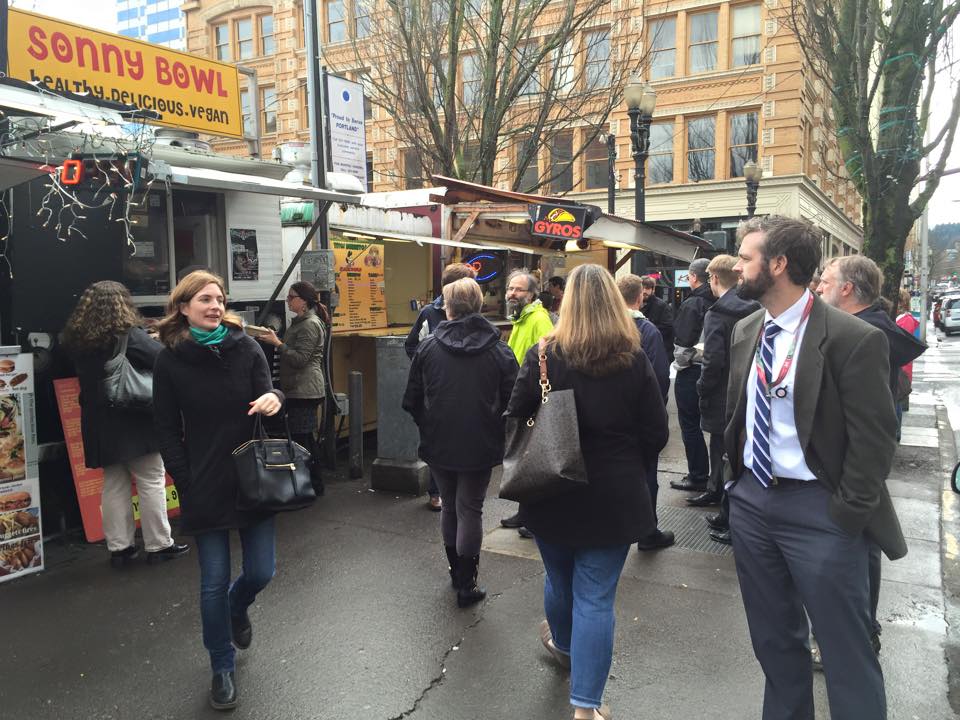
Even now all these years later people are turning to food carts because starting a restaurant here in Portland is too expensive! Food cart pods are amazing and Portland has so many delicious options even all the way in the far eastside where we are https://tacolaplaza.com